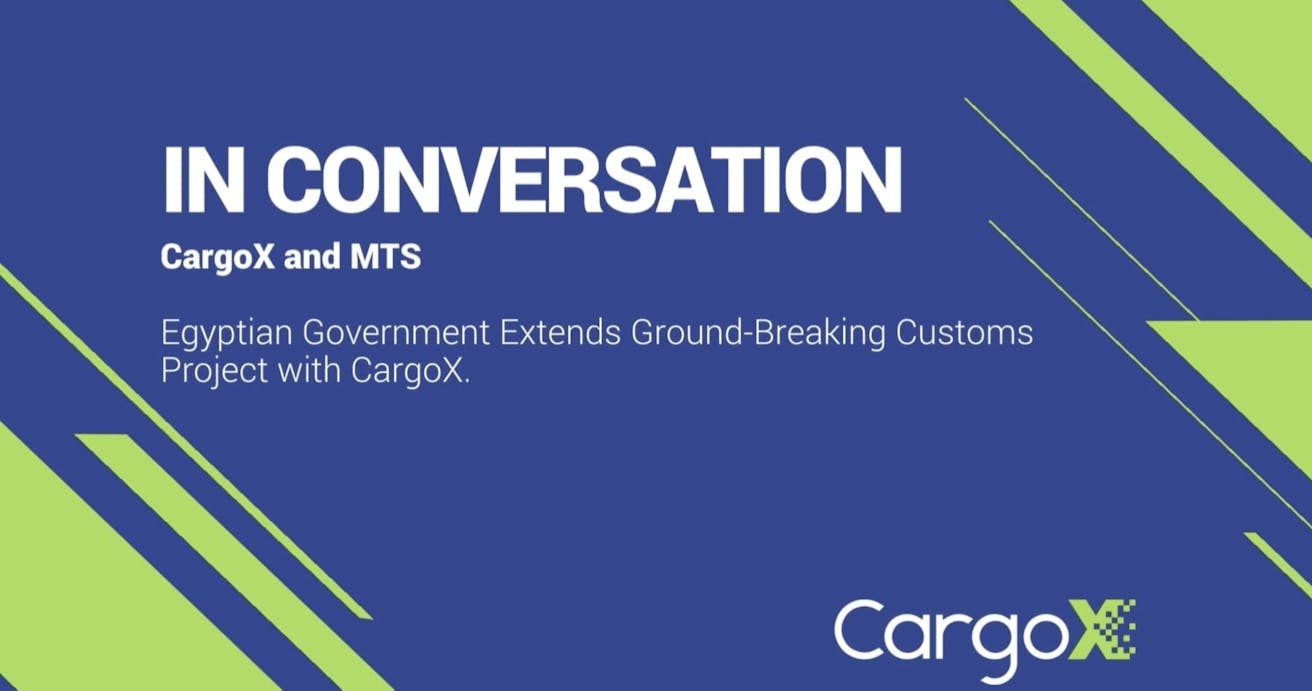
In conversation: Vjeran Ortynski and Gamal Kotb, GM, MTS, about the CargoX and NAFEZA integration benefits
The Egyptian Government has recently extended the ground-breaking customs project with CargoX (see the details here).
Vjeran Ortynski, CBDO, CargoX, used this opportunity to talk to Mr. Gamal Kotb, GM, Misr Technology Services (MTS), to explain the benefits of this collaboration for the exporters, importers, and Egyptian governmental agencies.
What does the CargoX–MTS partnership entail?
Gamal Kotb, MTS: Our project is about the Egyptian national single window for cross-border trade. When we talk about cross-border trade, we are talking about the exporter community abroad and also about the local community of businesses and government agencies in Egypt.
MTS needed access to the world outside the borders in order to obtain documents and other services. We researched this field and decided to enter into a partnership with CargoX, in order to provide a single-window system to those who export to Egypt. This community sees us through the CargoX Platform and their solution.
Vjeran Ortynski, CargoX: Gamal, you have put it nicely that we connect NAFEZA with the world, with an ecosystem of more than 75,000 companies across the globe.
Who are the users of Nafeza? What are the benefits for them?
Gamal Kotb, MTS: We have two classes of users in the trade community in Egypt. These are the importers, shipping agents and brokers, and more than 35 government agencies and organizations associated with cargo clearance.
CargoX contributes a lot to what we do. The trade community can provide Egyptian authorities with documents on time – there is no time wasted. No effort or cost is associated with receiving the documents from the source. At the same time, the government can rely on these credible documents, as they are issued by the owners and secured by blockchain technology. The documents arrive in real-time, which enables the government to stop processing paper documents. We no longer need physical archives, and we can rely on electronic archives. These are proper tools for better decision-making.
The companies that export cargo to Egypt – each one of the 75,000 – have been verified. They have gone through the KYC process, and the Government of Egypt knows every single exporter to Egypt. Some of them who have not been verified yet are in the verification process right now.
This brings another dimension to our country. Now we know exactly from whom, to whom, and what is imported. That is essential and crucial for the proper decision-making support in the country.
Today, more than 95% of import declarations presented in Egypt, are presented through the CargoX and NAFEZA systems. The remainder is special or individual cases that do not need to go through the compliance process of these systems.
At the moment we are covering 19 ports, and these cover more than 95% of Egypt's imports. Additionally, we have free zones in our country – and all the cargo in those zones is considered to be outside of the country.
By June 2022 the CargoX and NAFEZA will cover the whole of Egypt. The system will appear to outside users as a single port, and everything will be processed in a single window.
How will this partnership help the Egyptian Government?
Vjeran Ortynski, CargoX: We provide the governments with proof that the companies are verified and therefore authentic. This is a huge value. The government can automate many paper-driven processes in combination with the NAFEZA single-window. Egypt is now leading the way in the automatization and digitalization of global trade. To be honest, there is no similar use case in the world. We are proud to be part of that project, writing history.
Gamal Kotb, MTS: Yes, the roadmap for us, together with CargoX, is extending to more than one track. One of them is to reach for other countries in the region, to provide them with single window systems. It is not just a single window for customs – it is a system for all the agencies relevant for cargo clearance. For us, this opens the doors toward neighboring countries.
Another door opening is the unprecedented opportunity to digitalize trade finances for this type of cargo. The banks will be involved in this process, and we can all leverage two things – the technology, provided by CargoX, and the information needed for the banks and the governments to provide trade finance services. All the details will be available for every single transaction – risk assessment, profiling, and all other elements will be available for such institutions to make quick decisions in a secure, fast, real-time manner.
Vjeran Ortynski, CargoX: Every government digitizing processes like Egypt can build a large knowledge base. It is easy to check the historical records of every particular company, import, or commodity. This does not exist today – it can be available in real-time, for all the parties involved.
What did MTS see in blockchain technology and CargoX particularly?
Gamal Kotb, MTS: It is no big secret. CargoX was very smart, and they have developed their technology organically. MTS did not have sufficient in-house knowledge about blockchain and all the benefits it brings. CargoX, with their background, offered us a laboratory, a testing environment – a sandbox for us, with all the accounts, where we could get acquainted with the technology and its benefits. They helped us with work sessions, so we could digest and decide what we want to do with the technology. CargoX added value with suggestions, recommendations, and best practices from their experience. That really helped us realize everything we could do.
We tried a similar approach with other companies as well, but CargoX stood out by far.